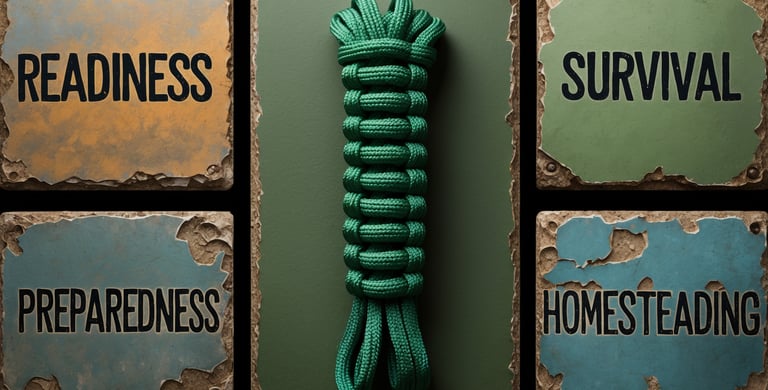Preparedness: Security Preparedness
Defense, Deterrence, and Fortified Peace
4FORTITUDER - READINESS, SURVIVAL, PREPAREDNESS, HOMESTEADING
Preparedness: Security Preparedness
Defense, Deterrence, and Fortified Peace
“A sword never kills anybody; it is a tool in the killer’s hand.”
— Seneca
Peace Without Strength Is Permission for Chaos
You can have all the food, all the water, all the medical gear—but if you cannot protect it, you do not own it. In collapse, defense becomes invisible currency—the difference between being a guardian or a target.
Security preparedness is not warmongering. It is fortified peace—creating a reality in which violence becomes unnecessary because your posture is undeniable.
In collapse, as in life, no one is coming. And even if they are, you may not want them to.
Core Knowledge Foundation: The Four Dimensions of Security Readiness
Mindset and Moral Framework – Why and when you fight.
Perimeter and Property Security – Physical barriers, alerts, and concealment.
Personal and Family Defense – Weapons, drills, coordination.
Community and Force Multipliers – Allies, signaling, and shared command.
Misconception Warning: Security is not a gun. Security is a system—rooted in wisdom, training, planning, and presence.
1. Mindset and Moral Framework
Why It Matters: A man who hesitates to protect becomes a victim of his own doubt.
How to Build It:
Define your Rules of Engagement (ROE) in peace.
When will I draw? Fire? Retreat?
Who has authority over defense in the home?
Train for clarity over rage. Anger clouds judgment. Calm channels force.
Defend only what you love. Never use your training to provoke. You are not a warrior unless peace is your default state.
Drill: Write your family’s Security Creed. 3 lines that define when you act, how you act, and what is non-negotiable.
2. Perimeter and Property Security
Goal: Make your home uninviting to predators, alert you early, and buy time.
How to Prepare:
Physical Fortification:
Reinforced doors + deadbolts
Window film + dowel locks
Security film over vulnerable glass
Motion lights, gravel paths (noise), thorny bushes under windows
Early Detection:
Wireless driveway alarms
Battery motion sensors
Dogs (real or dummy signs)
Appearance Strategy:
Avoid “prepper fortress” signaling
Blend into the environment; confidence, not provocation
Drill: Walk the perimeter of your home at night. Identify light blind spots, weak entries, sound vulnerabilities. Create a layered defense map.
3. Personal and Family Defense
Goal: Ensure every family member can respond appropriately—without chaos.
Weapons Systems:
Primary: Rifle (AR-15, AK, or reliable semi-auto)
Secondary: Handgun (Glock, Smith & Wesson, etc.)
Melee: Blade, bat, tomahawk
Improvised: Pepper spray, tactical flashlight, wasp spray
Skill Drills:
Dry fire weekly
Room clearing + entry control
Safe word for family action
Retreat paths and rally points
Storage:
Safe, fast-access lock boxes
Staged defense: car, home, pack
Ammo inventory and maintenance
Drill: Conduct a family “safe room” scenario. Assign roles. Practice 2 silent entry responses and 2 full-defense simulations. Include “non-lethal first” scenarios.
4. Community and Force Multipliers
Goal: You're only as strong as the most vulnerable member of your group.
How to Build Security Tribe:
Identify neighbors with:
Tools, radios, military/law enforcement backgrounds
Quiet competence, not bravado
Shared values of defense and de-escalation
Create a signal plan:
Whistle codes
Flashlight patterns
Colored flags or signs for “safe,” “not safe,” “need help”
Train together.
Range day.
Mock breach drills.
Watch rotations in blackout scenarios.
Drill: Create a 3-person rotation for a 12-hour night patrol. Include check-ins, codewords, and shift hand-offs. Track mental fatigue and response time.
Advanced Insights: Fortified Peace vs. Fantasy Violence
True security is boring. It’s structure, observation, and a calm hand on the grip—not paranoia or thrill.
The prepared man:
Builds layers of deterrence so confrontation is unlikely
Trains to act with precision, not panic
Understands that showing a gun is not the same as earning the right to use it responsibly
Historical Anchor: The Koreatown Roof Defenders (L.A. Riots, 1992)
While police abandoned the area, Korean-American shop owners armed themselves, posted in teams, and repelled looters without killing anyone. Their strength came not from aggression—but from organized, righteous defense.
Critical Perspectives: The Fear of Self-Defense
Adversarial Viewpoint:
“Preparedness is fine, but owning weapons just escalates things. Defense makes you a target.”
Response:
Tell that to the family who watched rioters walk past every other house except theirs. Defense isn’t escalation—it’s preemptive peace. When systems fail, defense becomes the final barrier between order and predation.
Wisdom and Warning Duality
When Followed: Your home becomes a hard target. Your family rests while others panic. You act with clarity and protect without shame.
When Ignored: You become dependent on systems that won’t come. You barter with fear. You kneel in your own home, asking mercy from men without it.
Strategic Crossroad: Will you build peace with strength—or wait until someone stronger steals what you failed to defend?
Final Charge & Implementation
Brother, your right to defend is sacred. Not because it makes you dangerous—but because it makes you accountable. You are the line. You are the shield. And the day that requires your strength may come without warning.
Start Now:
Build the 4-Tier Security Stack
“Defense begins before the threat appears.”
Moral framework and creed
Physical fortification + detection
Weapons access + family drills
Local allies + signaling plans
Establish Your Monthly Security Walkthrough
“If you don’t train in peace, you’ll panic in war.”
Check door/window locks
Walk property at night
Practice quick access to gear
Review ROE + teach one skill to spouse/child
Strategic Reflection:
Could you protect your home—tonight—without help, power, or mercy from the outside world?
Existential Challenge:
Will your children see you as the wall that stood—or the door that never locked?
Train in peace. Stand with calm. And be the man whose courage never needs to be proved—but is always ready when called.
“Security isn’t about killing the wolf. It’s about making sure he never chooses your door.”


